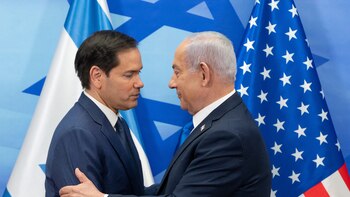
The Special Jurisdiction for Peace (JEP) announced Thursday that it rejected the request for submission of the former mayor of the municipality of Cerro de San Antonio, Magdalena, Luis Rafael Páez, who was investigated for having participated in the 'Chivolo Pact' in which public money was handed over to paramilitary groups.
This decision determined by the Chamber for the Definition of Legal Situations of the transitional justice comes after considering that the truth contribution plan of the former president, who is currently facing proceedings against him in the ordinary justice system, is “insufficient and unsatisfactory”.
“The contributions he made on situations in which his responsibility is not compromised were 'vague, without sustenance and denoted a clear absence of exhaustivity'. Nor did Páez Zambrano refer to 'facts or persons, beyond data that are public knowledge, which is why they did not exceed what has been demonstrated against them in the ordinary jurisdiction', which is the threshold required in transitional justice,” the JEP indicated.
On November 22, 2018, the former president, who is being investigated by agreement to commit an aggravated crime, embezzled for appropriation for the benefit of third parties and undue interest in the conclusion of contracts, signed a report of submission to the peace court, however, this request was not accepted by the JEP, which asked Páez Zambrano to expand his contribution project.
For its part, the Chamber for the Definition of Legal Situations indicated that these commitments were not enough, which is why it decided not to accept the submission and to exclude the former mayor who is currently on trial for having participated in the 'Chivolo Pact' and to hand over public money when he was in office to the Self-Defense Forces United States of Colombia (AUC) through public procurement.
“That is why the Chamber for the Definition of Legal Situations of the JEP ordered the Second Criminal Court of the Specialized Circuit of Santa Marta, once the decision is signed, to continue with the corresponding procedure in the ordinary jurisdiction,” concluded the JEP.
The businessman and rancher Dorance Romero known as 'Wilmer Romero', linked to the investigation into the appropriation of more than 10,000 hectares of peasant land in Turbo (Antioquia) in alliance with paramilitary groups, was left outside the Special Jurisdiction for Peace (JEP). The magistrates of the special court found inconsistencies that forced the defendant to adjust his plan of truth, as gaps were discovered in his contributions, 'Wilmer Romero' did not meet the standards, so he would have been denied submission to alternative penalties.
The merchant accepted before the JEP his responsibility for financing and supporting paramilitary groups such as the AUC Banana Bloc. But this was not enough for the judges who were waiting for a detailed report. In the midst of these proceedings, even the victims allegedly requested that Romero “return” at least 31 properties, which are allegedly in the name of their daughter Zulma Yidi Romero.
Dorance Romero is prosecuted in the ordinary courts for dispossession of land in the Turbo area, Antioquia, specifically in the districts of Macondo, Blanquiceth and other rural areas of the municipality of Urabá.
KEEP READING
Últimas Noticias
Debanhi Escobar: they secured the motel where she was found lifeless in a cistern
Members of the Specialized Prosecutor's Office in Nuevo León secured the Nueva Castilla Motel as part of the investigations into the case

The oldest person in the world died at the age of 119
Kane Tanaka lived in Japan. She was born six months earlier than George Orwell, the same year that the Wright brothers first flew, and Marie Curie became the first woman to win a Nobel Prize

Macabre find in CDMX: they left a body bagged and tied in a taxi
The body was left in the back seats of the car. It was covered with black bags and tied with industrial tape
The eagles of America will face Manchester City in a duel of legends. Here are the details
The top Mexican football champion will play a match with Pep Guardiola's squad in the Lone Star Cup

Why is it good to bring dogs out to know the world when they are puppies
A so-called protection against the spread of diseases threatens the integral development of dogs




